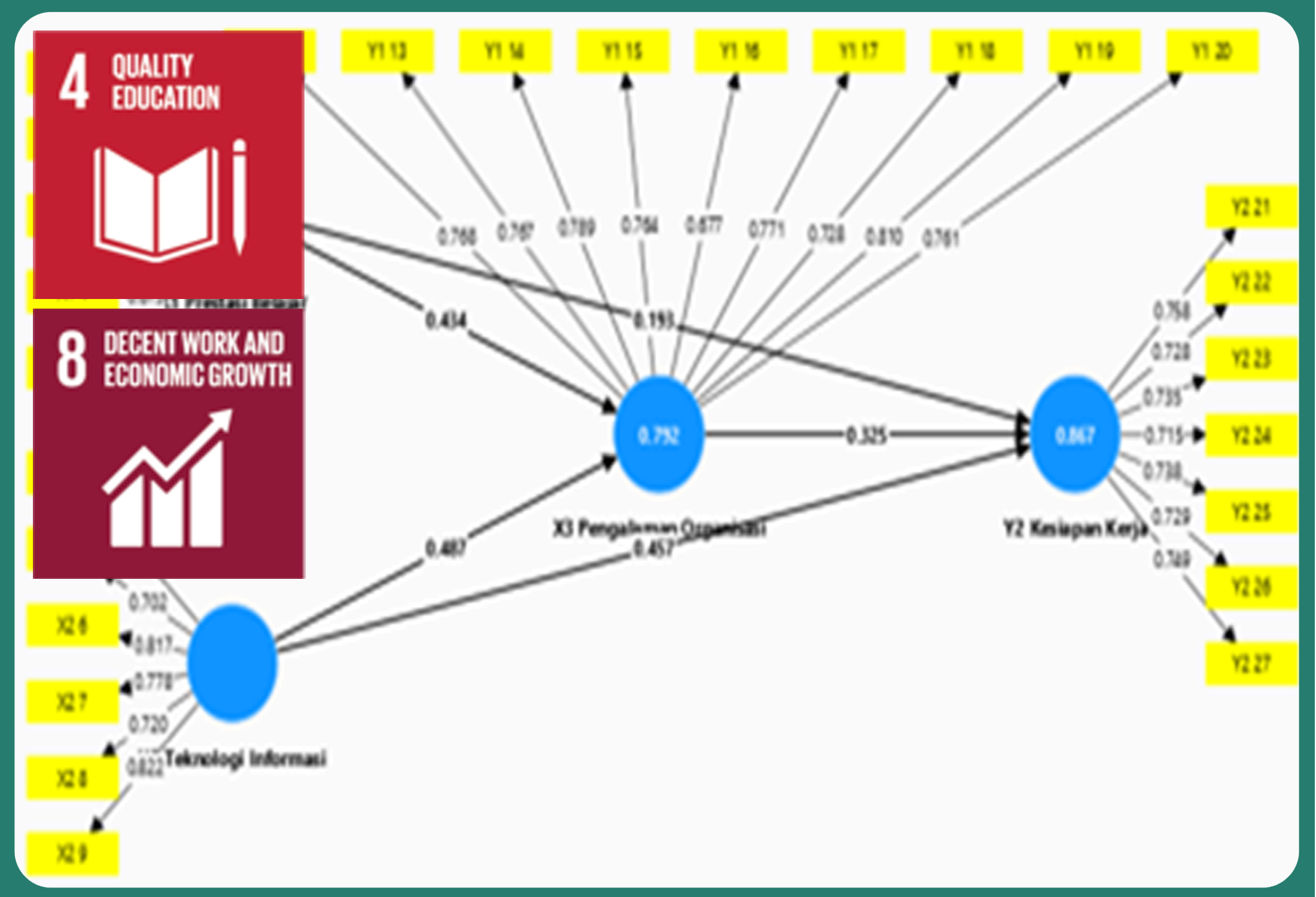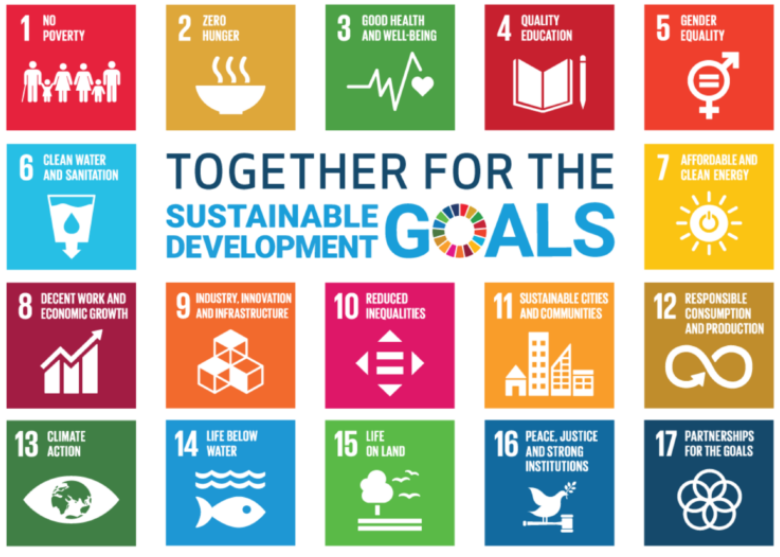The Influence of Academic Achievement, IT Proficiency, and Organizational Experience on Vocational Students’ Work Readiness: A Structural Equation Modeling Approach
DOI:
https://doi.org/10.24036/javit.v5i1.238Keywords:
Work readiness, Academic achievement, Information technology proficiency, Organizational experience, Vocational Education, SEM, Employability SkillsAbstract
In the era of rapid technological advancement and dynamic labor market demands, equipping vocational students with the right competencies for employability is more crucial than ever. This study explores how academic achievement, information technology proficiency, and organizational experience shape the work readiness of students in vocational education settings. Using a robust Structural Equation Modeling (SEM) approach via SmartPLS, data were collected from students at SMK Negeri 1 Linggo Sari Baganti. The results show that all three variables significantly and positively affect students' readiness for the workforce. More notably, organizational experience emerges as a key mediating factor, amplifying the influence of both academic performance and IT proficiency. This finding highlights a critical yet often overlooked aspect of employability preparation in vocational education. By integrating academic rigor, digital literacy, and active organizational participation, schools can foster a more holistic readiness among students for real-world challenges. This study contributes a fresh empirical model and offers strategic insights for policymakers and educators to design future-ready vocational curricula.
Downloads
References
L. B. Lan, “The Demand for Soft Skills and Impacts of Training and Development on Human Resource Outcomes and Firm Performance for the Malaysian Manufacturing Industry Doctor of Philosophy Faculty of Accountancy and Management Universiti Tunku Abdul Rahman,” no. April, May 2022, Accessed: Jul. 02, 2025. [Online]. Available: http://eprints.utar.edu.my/id/eprint/4432.
A. Ridwan, A. A. Wibowo, W. Widiyanti, D. Nurhadi, and I. Isnandar, “The Concept Directions of Development 21st Century Vocational Education,” Eurasia Proc. Educ. Soc. Sci., vol. 39, pp. 80–92, Dec. 2024, https://doi.org/10.55549/EPESS.874.
T. Santosa and L. F. Muhamad, “Optimizing Economic Development Through the Synergistic Influence of Information Technology on Educational Access and Human Capital Quality Enhancement,” J. Minfo Polgan, vol. 12, no. 2, pp. 2429–2437, Dec. 2023, https://doi.org/10.33395/jmp.v12i2.13290.
S. M. Indrawati and A. Kuncoro, “Improving Competitiveness Through Vocational and Higher Education: Indonesia’s Vision For Human Capital Development In 2019–2024,” Bull. Indones. Econ. Stud., vol. 57, no. 1, pp. 29–59, Jan. 2021, https://doi.org/10.1080/00074918.2021.1909692.
N. ThiHoa, N. T. Hang, N. T. Giang, and D. T. N. Huy, “Human resource for schools of politics and for international relation during globalization and EVFTA,” Ilkogr. Online - Elem. Educ. Online, vol. 20, no. 4, pp. 2448–2452, 2021, https://doi.org/10.17051/ILKONLINE.2021.04.281.
D. Qutni, M. Kristiawan, and Y. Fitriani, “Human Resource Management in Improving The Quality of Education,” Edunesia J. Ilm. Pendidik., vol. 2, no. 2, pp. 354–366, Feb. 2021, https://doi.org/10.51276/edu.v2i2.132.
F. Dahalan, N. Alias, and M. S. N. Shaharom, “Gamification and Game Based Learning for Vocational Education and Training: A Systematic Literature Review,” Educ. Inf. Technol., vol. 29, no. 2, pp. 1279–1317, Feb. 2024, https://doi.org/10.1007/s10639-022-11548-w.
C. F. Yeap, N. Suhaimi, and M. K. M. Nasir, “Issues, Challenges, and Suggestions for Empowering Technical Vocational Education and Training Education during the COVID-19 Pandemic in Malaysia,” Creat. Educ., vol. 12, no. 08, pp. 1818–1839, Jul. 2021, https://doi.org/10.4236/ce.2021.128138.
E. Schmid and V. Garrels, “Parental involvement and educational success among vulnerable students in vocational education and training,” Educ. Res., vol. 63, no. 4, pp. 456–473, Oct. 2021, https://doi.org/10.1080/00131881.2021.1988672.
M. Estrada, D. Monferrer, A. Rodríguez, and M. Á. Moliner, “Does Emotional Intelligence Influence Academic Performance? The Role of Compassion and Engagement in Education for Sustainable Development,” Sustain. 2021, Vol. 13, Page 1721, vol. 13, no. 4, p. 1721, Feb. 2021, https://doi.org/10.3390/SU13041721.
O. S. Kaya and E. Ercag, “The impact of applying challenge-based gamification program on students’ learning outcomes: Academic achievement, motivation and flow,” Educ. Inf. Technol., vol. 28, no. 8, pp. 10053–10078, Aug. 2023, https://doi.org/10.1007/s10639-023-11585-z.
Q. Luo, L. Chen, D. Yu, and K. Zhang, “The Mediating Role of Learning Engagement Between Self-Efficacy and Academic Achievement Among Chinese College Students,” Psychol. Res. Behav. Manag., vol. 16, pp. 1533–1543, 2023, https://doi.org/10.2147/PRBM.S401145.
Q. Zhang, L. Yu, and Z. Yu, “A Content Analysis and Meta-Analysis on the Effects of Classcraft on Gamification Learning Experiences in terms of Learning Achievement and Motivation,” Educ. Res. Int., vol. 2021, no. 1, p. 9429112, Jan. 2021, https://doi.org/10.1155/2021/9429112.
R. A. Rahimi and G. S. Oh, “Rethinking the role of educators in the 21st century: navigating globalization, technology, and pandemics,” J. Mark. Anal., vol. 12, no. 2, pp. 182–197, Jun. 2024, https://doi.org/10.1057/s41270-024-00303-4.
M. Marku, “Navigating the Future of Work: Human Capital in the Age of Industry 4.0,” Interdiscip. J. Res. Dev., vol. 11, no. 1, p. 190, Mar. 2024, https://doi.org/10.56345/ijrdv11n127.
M. Poláková, J. H. Suleimanová, P. Madzík, L. Copuš, I. Molnárová, and J. Polednová, “Soft skills and their importance in the labour market under the conditions of Industry 5.0,” Heliyon, vol. 9, no. 8, Aug. 2023, https://doi.org/10.1016/j.heliyon.2023.e18670.
V. V. Semenova, A. N. Zelenyuk, and Y. A. Savinov, “Human capital development: development of professional competencies through soft skills,” Rev. Tempos e Espaços em Educ., vol. 14, no. 33, p. e15253, Feb. 2021, https://doi.org/10.20952/revtee.v14i33.15253.
K. Mwita, S. Kinunda, S. Obwolo, and N. Mwilongo, “Soft skills development in higher education institutions,” Int. J. Res. Bus. Soc. Sci. (2147- 4478), vol. 12, no. 3, pp. 505–513, Apr. 2023, https://doi.org/10.20525/ijrbs.v12i3.2435.
H. Zhang and F. Li, “The multidimensional influence structure of college students’ online gamified learning engagement: a hybrid design based on QCA-SEM,” Heliyon, vol. 10, no. 18, p. e36485, Sep. 2024, https://doi.org/10.1016/j.heliyon.2024.e36485.
A. Chinnaraju, “Partial Least Squares Structural Equation Modeling (PLS-SEM) In The AI Era: Innovative Methodological Guide and Framework for Business Research,” Apr. 2025, Accessed: Jul. 02, 2025. [Online]. Available: https://papers.ssrn.com/abstract=5225441.
N. Poudel, M. Karki, and K. Shah, “Statistical Approach: Science and Application for Determining Optimal Sample Size in empirical study,” DEPAN, vol. 6, no. 1, pp. 108–117, Dec. 2024, https://doi.org/10.3126/DEPAN.V6I1.75501.
N. Nurkholis, Wilarso, P. Sukamto, M. A. Sobarnas, S. Jamaludin, and U. A. Tsani, “Digital Survey for Customer Satisfaction of Regional Drinking Water Companies (PDAM) using the mWater Application and the Slovin Formula Method,” BIO Web Conf., vol. 144, p. 03006, Nov. 2024, https://doi.org/10.1051/bioconf/202414403006.
P. Maneejuk and W. Yamaka, “Significance test for linear regression: how to test without P-values?,” J. Appl. Stat., vol. 48, no. 5, pp. 827–845, 2021, https://doi.org/10.1080/02664763.2020.1748180.
M. Alsadig and A. Zakariya, “The Influence of Emotional Competencies on University Students’ Perceived Employability: The Moderating Role of University Commitment,” Eurasian J. Educ. Res., vol. 2023, no. 105, pp. 52–69, 2023, https://doi.org/10.14689/ejer.2023.105.004.
A. Aggarwal, A. Mittal, I. Sharma, P. K. Chand, and A. Deshpande, “Success doesn’t come to you, you go to it: the role of self-perceived employability among engineering graduates,” Ind. Commer. Train., vol. ahead-of-print, no. ahead-of-print, 2025, https://doi.org/10.1108/ICT-07-2024-0073.
H. K. Duggal, W. M. Lim, P. Khatri, A. Thomas, and A. Shiva, “The state of the art on self-perceived employability,” Glob. Bus. Organ. Excell., vol. 43, no. 4, pp. 88–110, May 2024, https://doi.org/10.1002/joe.22245.
A. Rakowska and S. de Juana-Espinosa, “Ready for the future? Employability skills and competencies in the twenty-first century: The view of international experts,” Hum. Syst. Manag., vol. 40, no. 5, pp. 669–684, 2021, https://doi.org/10.3233/HSM-201118.
B. P. Ping Yong and Y.-L. Ling, “Skills Gap: The Perceptions of Importance of Soft Skills in Graduate Employability Between Employers and Graduates,” J. Techno-Social, vol. 15, no. 1, pp. 16–33, Jun. 2023, https://doi.org/10.30880/jts.2023.15.01.002.
S. Nikou, M. De Reuver, and M. Mahboob Kanafi, “Workplace literacy skills—how information and digital literacy affect adoption of digital technology,” J. Doc., vol. 78, no. 7, pp. 371–391, 2022, https://doi.org/10.1108/JD-12-2021-0241.
D. Cetindamar, B. Abedin, and K. Shirahada, “The Role of Employees in Digital Transformation: A Preliminary Study on How Employees’ Digital Literacy Impacts Use of Digital Technologies,” IEEE Trans. Eng. Manag., vol. 71, pp. 7837–7848, 2024, https://doi.org/10.1109/TEM.2021.3087724.
X. Wang, Z. Zhou, and C. Wu, “Enhancing vocational students’ identities through program-occupation-skill alignment and learning experiences: A mediation analysis based on learning experiences,” Vocat. Technol. Educ., vol. 2, no. 1, p. 2025, Mar. 2025, https://doi.org/10.54844/VTE.2025.0888.
B. Khampirat, “The Impact of Work-Integrated Learning and Learning Strategies on Engineering Students’ Learning Outcomes in Thailand: A Multiple Mediation Model of Learning Experiences and Psychological Factors,” IEEE Access, vol. 9, pp. 111390–111406, 2021, https://doi.org/10.1109/ACCESS.2021.3055620.
S. O. Chukwuedo and C. N. Ementa, “Students’ work placement learning and employability nexus: Reflections from experiential learning and social cognitive career theories,” Ind. High. Educ., vol. 36, no. 6, pp. 742–755, Dec. 2022, https://doi.org/10.1177/09504222221099198.
Y. Zhao, M. Zhao, and F. Shi, “Integrating Moral Education and Educational Information Technology: A Strategic Approach to Enhance Rural Teacher Training in Universities,” J. Knowl. Econ., vol. 15, no. 3, pp. 15053–15093, Dec. 2023, https://doi.org/10.1007/s13132-023-01693-z.

Downloads
Published
How to Cite
Issue
Section
License
Copyright (c) 2025 Risko Agus Susanto, Muhammad Adri, Ika Parma Dewi

This work is licensed under a Creative Commons Attribution 4.0 International License.










